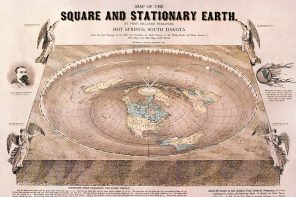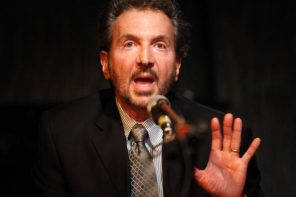Does homosexuality have any scientific basis? Does it matter if it does?
Our genetics and epigenetics reflect our environment which reflects back on our genes. Biology drives culture which drives biology in an unending embrace. It’s both the chicken and the egg.
Last week California’s highest court began to take another look at whether marriage should only be between a man and a woman. For one brief period four years ago, during which 4,000 marriage licenses were issued to same-sex couples in San Francisco, such marriages were legal in California. As goes California, so usually goes the rest of the country—or so goes the axiom, in any case.
It’s odd how science has become the ultimate arbiter in our society, how it’s taken on such power. Ironically, sometimes those who wish science didn’t have so much power give it more by facing off against it. Some creationists, for example, spend a lot of time and money defending their beliefs with convoluted “scientific” justifications, instead of just believing. They say, for example, that the fossil record appears as it does because of the way organisms floated differently after Noah’s flood or that Noah couldn’t fit dinosaurs on his ark, so he just took their eggs. In effect they’re saying, “I’m going to prove your worldview wrong by using it to show how mine is right.”
It’s easy to see why you would do this, of course: science has the authority.
In fact, some portions of the gay community seek the very same imprimatur of science to support and defend their identities—identities which many of these same biblical literalists claim are at best immoral.
The science of homosexuality itself tells a very interesting story.
If one identical twin is gay, his twin is more likely than his non-twin brother to also be gay. This data suggests a role for genes in homosexuality, though you may be surprised that the likeliest candidates are smell genes.
Like other organisms, humans rely on olfaction quite a bit; probably more than we realize. Unique among any of our sense nerve cells, olfactory neurons have direct connections to the memory and limbic—base emotional—parts of our brains. Think about how that one smell can evoke powerful and emotional memories. Also like other organisms, we use our sense of smell to detect pheromones, volatile chemical signals secreted by one organism that can induce behaviors in other members of the same species.
Humans and other organisms use pheromone detection to help select mates. This detection system probably uses parts of our immune system, of all things, to allow us to differentiate individuals and determine important information about their history and identity. A set of proteins called MHC that helps differentiate self from non-self (a vital issue for your immune system) is central to this process and to the success of your immune system. The more diverse your immune system, the more effectively it can respond to invasion, the greater the survival of you and your offspring. In fact, some scientists argue the value of and need for a diverse immune system helps explain the evolution of two different sexes in the first place, because sexual reproduction leads, through chromosomal mixing, to genetic and immune system diversity.
We haven’t quite figured out the whole process yet, but it goes something like this: Humans have special modified sweat glands that develop after puberty. These glands secrete odorous stuff, including sex steroid compounds and MHC immune system elements, specific to each individual’s immune system. We detect smells, probably from these compounds, in sweat. People can tell by smell if a male or female wore a sweaty T-shirt. And people are more attracted to smells of the opposite sex that have the most dissimilar MHC molecules. This effect is linked to fertility because it goes away when women are on the pill.
It gets even more intriguing. Extracts from men’s sweat can make women’s ovulatory cycles more regular and stimulate an area in women’s brains known in other primates to be activated during copulation. Women are also 1000 times more sensitive to masculine odorants than men; they are especially sensitive to them in their pre-ovulatory and ovulatory phases of menstruation. Similarly, areas of the brain known to be involved in male sexual arousal are activated when men smell female pheromones.
Smell then is linked by pheromones to an individual’s identity and sex. These pheromones, in turn, are not only detected by others, but also activate in them complex behaviors. If this typical heterosexual process is altered by changes in our genes, cells, or physiology, could it predispose to homosexual behaviors?
We don’t know for sure yet, but it would certainly make sense. In one study in humans, the part of the brain stimulated by male-secreted pheromone was similarly activated in heterosexual women and homosexual men, but not in heterosexual men.
And we have more strong hints from mouse research. Of course, mice aren’t humans, but they’re a good model for us since they share most of our genes, basic behaviors, and systems. Catherine Dulac at Harvard has shown male mice with inactive pheromone-sensing systems can’t tell mouse sexes apart and are deficient in the usual male-male aggression behaviors. Female mice missing the same detection system lose the typical maternal aggression and lactating behaviors. Instead, they display male sexual and courtship behaviors. This suggests pheromone signaling in females turns off male behaviors and activates female ones and that the machinery for male-specific behaviors exists in the normal female mouse brain!
If homosexuality does indeed have a biologic basis, does that make it okay or acceptable? You could say, yes, these folks have a biologic predisposition to a complex behavior or you could say, no, it’s biological, but it’s a disease to be overcome (homosexuality was listed as a disease, “sexual deviation,” in the original 1960s psychological diagnostic manual; it is no longer).
Of course, sex is one thing, and social forces like religion and social conventions like marriage, quite another.
I think of two friends from my childhood. After college, Dave told me he’d always been gay but as a Christian realized this was wrong; he worked with God to become heterosexual, married, and has children. Mark also “came out” after college and decided to change his entire life focus, leaving his job and immersing himself in a predominantly gay community and lifestyle. Are both Dave and Mark gay? Only Mark?
What about arranged marriages, which would appear to take most of the pheromonology out of the equation, or cultures in which marrying your relatives, folks very genetically similar to you, is the norm (Darwin married his first cousin), or even the only option?
What we have is a Biology-Religion-Ethics triangle of interrelated, interacting forces with policy and law sitting right in the middle. What will the California court decide?
I don’t know. But it’s becoming increasingly clear that biology drives culture which drives biology which drives culture in an unending embrace.




